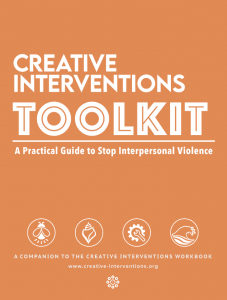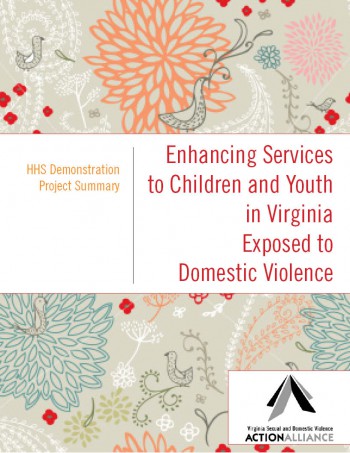Resources Library: Community Coordination & Collaboration
Start a Search:
Creative Interventions: A Practical Guide to Stop Interpersonal Violence

Creative Interventions was founded to shift education and resources back to families and communities. Established in 2004, the project aimed to place knowledge and power among those most impacted by violence. Creative Interventions sought to make support and safety more accessible, stop violence at early stages of abuse, and create possibilities for once abusive individuals and communities to evolve towards healthy change and transformation.
In their words:
"This Toolkit the result of a 3-year period from 2006 to 2009 during which CI joined with partner organizations in the San Francisco Bay Area including Asian Women's Shelter, Shimtuh, Narika, and La Clinica de la Raza. We also had partnerships with other individuals and organizations such as those listed in Section 0.2: A Community Effort. Our organizations worked closely together to create a different, alternative approach to issues of domestic violence and sexual assault. All of our organizations have years of experience working in mostly immigrant communities on the issues of domestic violence and sexual assault. And all were interested in coming together to try to create different options for people experiencing violence. The 3-year project that we called the Community-Based Interventions Project brought our team together to create a new vision for violence intervention, to work with people experiencing violence, and to develop a model and tools from our work during that time."
Check out these toolkits developed by people who want to end the cycle of violence in our communities and our world. The 500+ page toolkits are available for download in English and Spanish but clicking the links below. Additional resources are available by visiting the Toolkits section of their website.
Cultivating SART Efficacy: Insights on the Impact of the Virginia Sexual Assault Response Team Mandate Report
The Virginia Department of Criminal Justice Services (DCJS) is pleased to release the report, Cultivating SART Efficacy: Insights on the Impact of the Virginia Sexual Assault Response Team Mandate. A collaborative effort between DCJS and the Sexual Violence Justice Institute at the Minnesota Coalition Against Sexual Assault (SVJI), the project explored the implications of the 2009 Code of Virginia legislation (§ 15.2-1627.4) that mandated the establishment of a multidisciplinary response to criminal sexual assault in each locality.
As you’ll see in the report, numerous considerations are presented to further enhance Sexual Assault Response Team (SART) efforts in Virginia. In the coming months, DCJS will begin exploring these considerations through a variety of collaborative efforts, to include training, resource development, SART protocol revisions, and more. We look forward to helping SARTs throughout Virginia become more efficient, more effective, and better able to serve victims of sexual assault.
A summary of results from the full national project is also available here.
Enhancing Services to Children and Youth in Virginia Exposed to Domestic Violence

A report on a 2-year (2006-2008) demonstration project funded by the Family Violence Prevention and Services Program.
Published by Virginia Sexual & Domestic VIolence Action Alliance, 2009.
56 pages.
Exploring the Implications of Virginia’s Sexual Assault Response Team (SART) Code Mandate
In 2009, the Code of Virginia was amended to mandate local sexual response teams (SARTs). As part of a national initiative to explore the impact of mandates on the formation, performance, and efficacy of SARTs, in 2016 the Virginia Department of Criminal Justice Services (DCJS) partnered with the Sexual Violence Justice Institute (SVJI) to explore the mandate’s implications and gain insight into what SART ecosystems need to become strong and effective. The results of the project were documented in a report titled Cultivating SART Efficacy: Insights on the Impact of the Virginia Sexual Assault Response Team Mandate. The report highlights the ripple effects of the mandate’s passing, lingering questions, and insights and ideas for resources to support SART growth, strength, and sustained success.
TO VIEW THE RECORDED WEBINAR, CLICK HERE. (You will be required to "register" before viewing the recording)
Topics addressed:
· Impact of the mandate on the growth of Virginia SARTs
· Impact of the mandate on SART efficacy
· Challenges of mandate implementation
· Other notable events that occurred as a result of the mandate
· 7 Elements of a healthy SART Ecosystem
· Considerations and resources for enhancing SARTs
For More Information, Contact:
Jennifer Kline
(804) 225-3456
Kristina Vadas
(804) 786-7802
FACT Issue Brief—Older Adults and Family Violence
This FACT Issue Brief identifies forms of family violence and abuse faced by older adults and summarizes research on effective ways communities and households can identify and prevent further abuse. Promising strategies designed to protect the safety and security of the older adult population within the Commonwealth of Virginia are highlighted.

